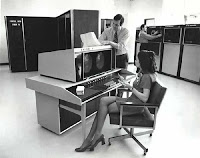Old technologies hang on for decades
 What do radio, mainframe computers and photocopiers have in common?
What do radio, mainframe computers and photocopiers have in common?
They were all predicted to die a quick death at the hands of a successor technology, and all are still here today.
The New York Times profiles the venerable IBM mainframe, still a multi-billion-dollar business (not that any CIO would admit publicly to buying one), which has hung on through the minicomputer revolution (remember DEC?), the PC revolution and the client-server revolution.
According to the Times article, "survivor technologies" retain certain compelling benefits that the successors do not offer. Hence, for certain niches, they continue to provide value. For radio, it is the idea of "audio wallpaper," entertainment that's less distracting than video--i.e., good while driving or working. For the mainframe, it was the ability to retain billions of dollars of software investment while taking advantage of hardware's increased price-performance. Photocopiers offer easy-to-handle and share hardcopy documents that the paperless office can't provide. (I worked for a year without a copier and was that ever a pain.)
So consider this: the next time you read that a certain technology will be obsolete within five years, you may want to buy some stock in the dinosaur.
(Photo: an IBM mainframe that is likely no longer in service.)
innovation, product management, marketing, New York Times



3 comments:
Great point, John.
You're right about some older technologies having staying power. You and I come out of technology and tend to be on the front end of the life-cycle curve--we're early adopters. By there are millions of business people out there that are conserably less daring and they control billions of dollars.
I love hearing stories of companies that continue to successfully market and sell older technology. Something they all have in common is that they understand their sweet spot. They aren't trying to compete with cutting edge solution providers. In fact, they often don't pursue business where technology leadership is a decision criterion.
Great point, John.
You're right about some older technologies having staying power. You and I come out of technology and tend to be on the front end of the life-cycle curve--we're early adopters. By there are millions of business people out there that are conserably less daring and they control billions of dollars.
I love hearing stories of companies that continue to successfully market and sell older technology. Something they all have in common is that they understand their sweet spot. They aren't trying to compete with cutting edge solution providers. In fact, they often don't pursue business where technology leadership is a decision criterion.
Dave, you are 100% right on how smart companies can continue to sell old technology for seemingly ever. I remember being particularly inspired by an old New Yorker article that chronicled the history of the ice business, which is still around even today. "If people can still sell ice," I thought, "I can certainly sell this AS400 software product."
Post a Comment